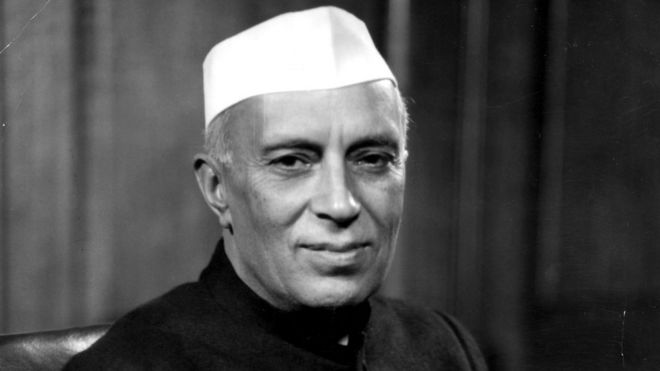
Much of India's early domestic and foreign policy was based on Nehru's ideas
A periodical
published by India's main opposition Congress has criticised India's
first prime minister Jawaharlal Nehru over his foreign policy moves.
The unsigned piece in Congress Darshan said Nehru faltered in his initiatives in Kashmir, China and Tibet.Nehru was a leader of the Congress party and its current vice-president Rahul Gandhi is his great grandson.
The editor of the periodical, Sanjay Nirupam, apologised for the article and said he would investigate the matter.
Mr Nirupam, a senior party leader, told the Indian Express that he was "not involved in the day-to-day functioning of the magazine and was unaware of the article".
"I do not agree with the article. It seems to have been sourced, but I don't know who the writer is," he said.
Mr Nirupam said "action will be taken against people in the editorial team who are responsible for the mistake".
Nehru played a central role in the negotiations over Indian independence and finally became the first PM of the country in 1947.
Congress won India's first general elections in 1951-52 under Nehru's leadership. Much of India's domestic and foreign policy was based on his ideas in the early years of India's independence.
The article in the latest Hindi edition of the periodical says Nehru should have listened to his deputy prime minister Vallabhai Patel's views on foreign policy.
Independence hero Patel is credited with uniting India's several princely states as the country's first home minister.
"Although Nehru was in charge of foreign affairs, but Patel, being the deputy PM, would sometimes attend the cabinet meetings on foreign affairs. Today's problems wouldn't have existed had Patel's foresight in the Kashmir issue been considered then," the article in Congress Darshan said.
"As far as Kashmir is concerned, Nehru was in charge. But it's true that Patel was upset with the decision to hold a plebiscite in Kashmir and take the issue to the United Nations."
In October 1947, Nehru faced conflict with Pakistan over the state of Kashmir, which was disputed at independence.
Nehru sent troops into the state to support India's claim. A UN ceasefire was negotiated, but Kashmir remains deeply unstable to this day.
The article also cites a letter that Patel reportedly wrote in 1950 to caution Nehru against China's policy towards Tibet and where "Patel described China as unfaithful, and a future enemy of India".
Despite efforts at co-operation by both countries, Indian-Chinese border disputes escalated into war in 1962 and Indian forces were decisively beaten.
This had a significant impact on Nehru's declining health and he died in May 1964.
